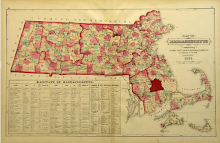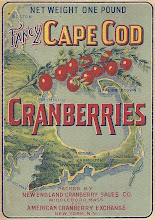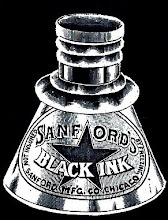.jpg) One may say: "Only those who have known you through life would be interested in reading of your childhood days." It is sometimes pleasant to remember that we were once children.
One may say: "Only those who have known you through life would be interested in reading of your childhood days." It is sometimes pleasant to remember that we were once children.My life has been passed at my home on Nemasket street. I have not journeyed afar, as friends whom I could visit dwelt within a radius of fifty miles. Before my remembrance, my parents attended church at "Middleboro Green," two miles distant. When the daughter church, or Central Congregational was built at "The Corners," people hereabouts attended there, it being nearer. Before there was an organ in the church the choir was assisted by stringed instruments: two violins and a bass viol were played by Horatio Wood, Jr., J[ames] M. Pickens and my father [Edmund W. Deane]. After an organ had been procured [in 1871] (to which, I have heard, the older members were at first, loth to listen), A. J. Pickens became chorister, holding the position for years, even until I became an organist there. Nearly every family in this vicinity attended church, the forenoon services being from 10:30 to 12; and the afternoon from 1:30 to 4 o'clock; with lunches at noon; we sat near the "register," while eating them (it now seems "small rations" on which to have been prepared for the afternoon services).
I always enjoyed the music, and could keep awake to hear that, afterward, with my head resting upon mother's lap, the "firstly" and "secondly" of Rev. Isaiah C. Thatcher's sermons sounded far away, yet I always heard "fourthly," as that meant nearing the close. When Mr. Thatcher returned for a second pastorate [1856-60], his sermons seemed of greater interest, and I learned to know him as an able preacher and a faithful pastor.
The younger members of families usually occupied pews with their parents; but if any young man, thinking to "disturb the peace," chose a back seat, Mr. Thatcher's keen eyes were upon such an one, and if whisperings were heard from that direction, his discourse was brought to an abrupt pause, and, with right arm extended, pointing directly at the offender, most emphatically would say: "You, young man!" He then continued his sermon, no further reprimand being needed and quietness reigned in the sanctuary during the remainder of the services. Sunday and Thursday evening services were in the chapel near the church, also the Sunday school. I still have the catechism which I carried the first Sunday. Settees were arranged in hollow squares, a girl of my own age, who was seated beside me in the class, thinking, no doubt, to make me feel at home, whispered, "We have dresses alike, haven't we!" (they were of buff woolen material). I have always felt kindly toward her for those few initiatory words, even when she became the wife of a deacon in the church. I next beheld the pleasant face of my teacher, Elizabeth Harlow, and shall not soon forget her smile of welcome. She afterward became the mother of our townsman, Judge Nathan Washburn.
 Nor heat, nor cold, seemed to hinder Sabbath observances, I recall, especially the cold days. My first appearance at church was in a blue plaid cloak, with cape reaching to the waist, and a blue bonnet. My hands were kept warm within a muff of gray and black fur, which by myself was thought to be "quite fine" for father had journeyed to Fall River (seeming, then, far distant), to purchase it as a Christmas gift. None since have seemed as choice, although brought from the far-off region of Siberia. When returning home from church, we, as neighbors walked a part of the way in company; then my father would say, "I will hasten on and kindle a fire," others followed, and with long strides, their tall hats were soon lost to view. After walking a mile across the snow, facing genuine New England wintery winds, genial firelight, with a good hot supper, soon brought warmth and comfort. Father, mother and myself enjoyed at twilight hour singing the much-loved hymns which children nowadays are not accustomed to sing, or hear:
Nor heat, nor cold, seemed to hinder Sabbath observances, I recall, especially the cold days. My first appearance at church was in a blue plaid cloak, with cape reaching to the waist, and a blue bonnet. My hands were kept warm within a muff of gray and black fur, which by myself was thought to be "quite fine" for father had journeyed to Fall River (seeming, then, far distant), to purchase it as a Christmas gift. None since have seemed as choice, although brought from the far-off region of Siberia. When returning home from church, we, as neighbors walked a part of the way in company; then my father would say, "I will hasten on and kindle a fire," others followed, and with long strides, their tall hats were soon lost to view. After walking a mile across the snow, facing genuine New England wintery winds, genial firelight, with a good hot supper, soon brought warmth and comfort. Father, mother and myself enjoyed at twilight hour singing the much-loved hymns which children nowadays are not accustomed to sing, or hear:Illustrations:
"Central Congregational Church, Middleboro, Mass.", A. S. Burbank, publisher, postcard, c. 1910.
This postcard depicts the Central Congregational Church as it looked following remodelling in 1891. The church attended by Jerusha Deane in her childhood would have looked muched different.
"Image 1086", tambrieann, photographer. Republished under a Creative Commons license. Some rights reserved.
.






















+of+Smoky+Mountains+018.jpg)
0 comments:
Post a Comment